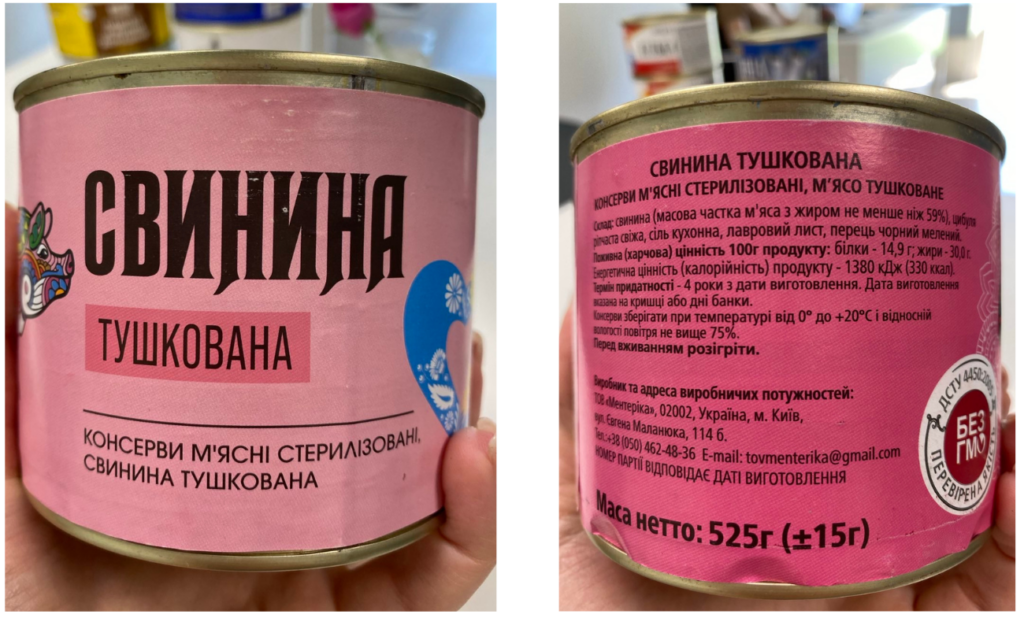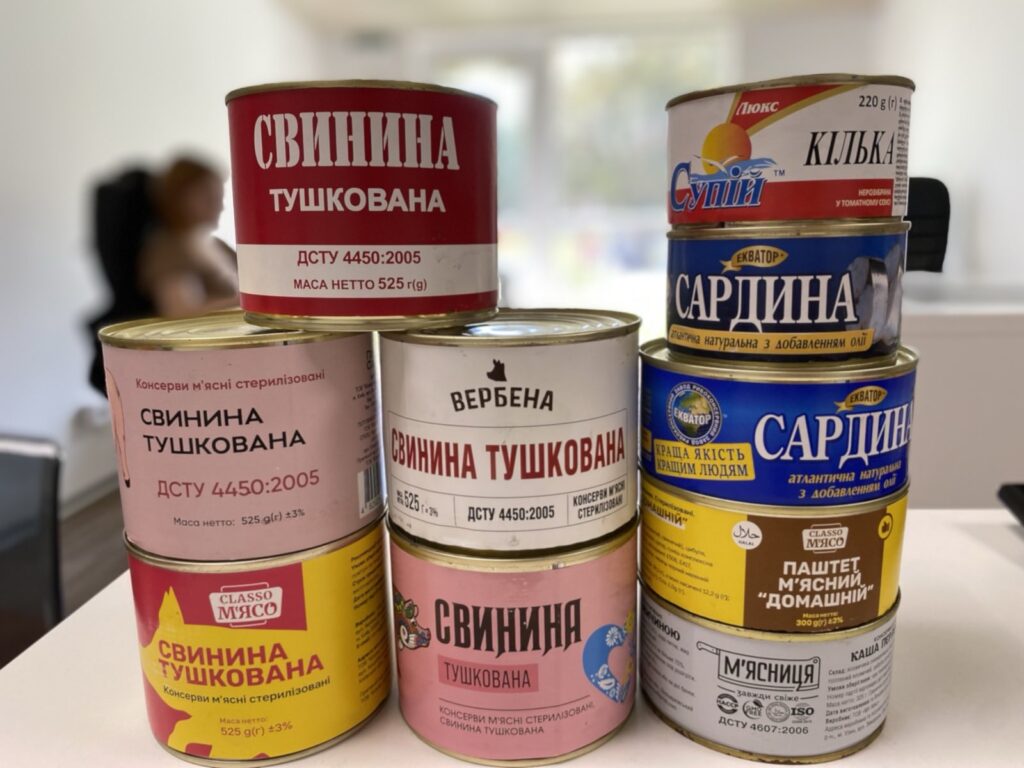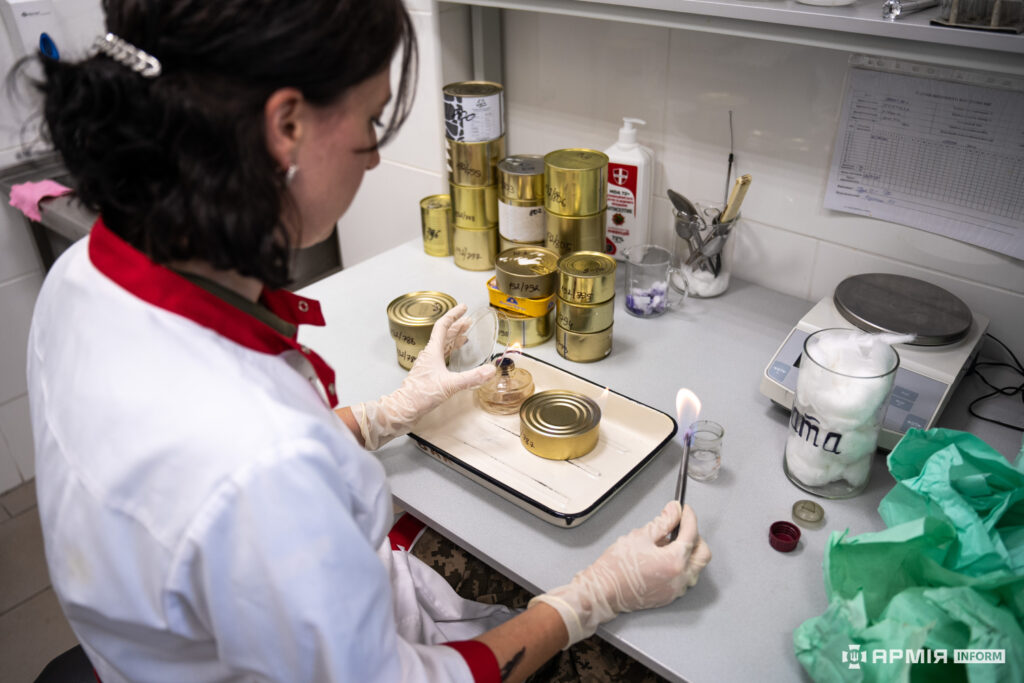The complaints about the quality of food, eaten by Ukrainian fighters on the frontline, are frequent in social networks and even more so — in private conversations. However, it is difficult to find documented proof to verify the fairness of these claims. Unpalatable, inedible, nasty — all these are the speaker’s subjective evaluative judgements. Tastes differ; after all, the army, especially in combat realities, is not a restaurant.
Yet, there are objective methods to control food quality, including its compliance with state standards. This control should be exercised by specially certified laboratories within the structure of the Ministry of Defence.
NGL.media found out that at least one such laboratory approved the delivery of almost 11 thousand cans of stewed pork to the AFU, which turned out to be unfit for consumption. In fact, it was a case of the substitution of the content in these cans when producers filled them with cords, skin, and soft tendons instead of meat.
NGL.media publishes only exclusive investigations and analytics based on big data. Please support our work so we can make more content like this
“When they pee on our legs, at least they should stop telling us it’s raining”
In early July, Dmytro Vlasenko, a commanding officer of one of the battalions holding the defence in Pokrovsk direction, got in touch with NGL.media. He talked about the poor quality of food products received by his battalion, among others.
“In the AFU, this problem is global. Food products, supplied [to us], are impossible to consume,” Vlasenko said. “I don’t have a problem with that because I practically don’t eat this food: I receive it and feed it to the dogs.” Yet he added that even dogs felt bad from this food.
The officer claimed that regardless of the location Dmytro Vlasenko voluntarily joined the AFU immediately after the full-scale invasion of the russians. During his service, he happened to fight in many front sectors the food quality is constantly poor. “These are centralised deliveries [of food]; everyone receives them, and wherever we are, we get this nasty stuff,” he said.
Now Vlasenko’s battalion fights near Pokrovsk, the hottest and most critical sector of the eastern front, where fierce battles have been going on for several months. “Every day is a disaster here — the best people lose their lives, and are losing them in these very moments. People sacrifice themselves, and they are practically not treated as humans in the most essential matter — their food,” Dmytro worried. “It cannot go on like that. People lose their health because of this food. Young fighters, boys of 25–30, hardly have any teeth left in their mouths.”
The most common complaints are about canned meat and fish, which are the basic food for the military involved in active combat. “We practically live on cans,” NGL.media heard from another serviceman from Zaporizhzhia sector this time, who asked for anonymity.
“When people are on field missions with no possibility to cook any food, cans are ordered: stewed meat, fish,” Dmytro Vlasenko continued his explanation. “It does not get spoiled and can be opened, warmed on the fire and eaten. But these cans [which are brought to us] contain water, the skins of animals are there instead of meat, and sardines or anchovy in tomato sauce are actually poison. [This canned food] neither has good food qualities nor complies with its labels, for instance, those of “higher quality”.
NGL.media talked to a number of servicemen from different arms of the service in different front sectors who confirmed Vlasenko’s claims about canned food of poor quality. However, unlike him, they are willing to talk only anonymously. “Here, where we are [on the frontline], those who talk much get a CI a combat instruction — a commander’s order to the subordinate unit or a specific serviceman with a concise and clear formulation of the purpose of the operation and the term within which it should be achieved to the “zero” line, from which they do not come back,” said one of them to NGL.media.
Dmytro Vlasenko is not afraid to talk openly; in fact, he insists on it. “I feel that I am standing up for the truth, so I don’t care. I am doing it not for my personal benefit but for people. Am I to be afraid to speak the truth in my own country?” he said emotionally in response to the question about the consequences of the publication he might personally face. “I see these [dead] boys in my dreams almost every night. The most honest and ingenious are the first ones to die. What for? For counterfeit canned meat? Or for eggs, priced 17 hryvnia per one? When they pee on our legs, at least we should stop telling that it’s raining.”
“Tasting once is better than hearing ten times”
The officer said that he had addressed journalists only after fruitless attempts to attract the attention of the Ministry of Defence to the problem of poor food. “I tried to communicate with SLO the State Logistics Operator — an enterprise of the Ministry of Defence, covering non-lethal army’s needs. The SLO is responsible for procuring food products and signing contracts with suppliers. The quality of these products is controlled by the profile department of the Ministry of Defence, which will be described below. I sent them food products. They wrote back to me that they would arrange unscheduled checks, but there has been no response since,” he explained.
It is unknown whether Dmytro’s determination had any impact, but in early July, the Ministry of Defence announced that following the inspection results, they did not allow the supply of about 340 tons of poor quality and dangerous food products to the AFU, including over 240 tons of stewed pork and beef.
As it turns out from the reply of the Ministry of Defence to the NGL.media inquiry, the most common reason for banning canned meat was the excessive amount of “non-spore-forming microorganisms”, which demonstrated non-sterile production (132.5 tons) and the insufficient amount of meat itself (85.6 tons).
The Ministry of Defence claimed that all the food products, proven poor or dangerous by the inspections, had to be replaced by the suppliers within 48 hours. There is no refusal from procurement of food products from unfair producers because the contracts with them are signed by supplying companies, not the structures of the Ministry of Defence.
After those inspections, NGL.media suspended their work at this investigation hoping that the situation with the quality of food for the AFU would improve without any public exposure. Alas. Vlasenko told us about the poor quality of canned meat almost in each delivery, and the battalion receives food every week.
“Tasting once is better than hearing ten times. Then it might be easier for you to understand why I get so mad,” Vlasenko wrote us one day. I have been collecting all this “trash” for a month. I have sent you different “goodies”. Not only canned meat.”
So, in mid-August, the editorial office of NGL.media received a parcel with cans of food for soldiers: five cans of stewed pork from different producers, paste, anchovies in tomato sauce, two cans of sardines in oil, and pearl barley porridge with beef.
At first, we intended to compare the food for the AFU with similar food products bought at the free market. Our primary hypothesis was that maybe the producers intentionally make food for the army cheaper, directly impacting the quality. Yet we did not succeed in finding these cans in trade networks, small shops, or markets of Lviv. Only three out of ten cans can be bought on the Internet — stewed pork “Verbena”, sardines “Equator”, and anchovy in tomato sauce “Supiy”. So, we had to dismiss the idea of the comparison and try to evaluate the quality of the canned food we received on our own.
The final conclusion of NGL.media employees was as follows: nine out of ten cans belong to the trash bin. Only pearl barley porridge with beef was found to be more or less acceptable in terms of its taste, smell, and look.
However, every subjective opinion requires objective confirmation. So NGL.media addressed an independent certified laboratory. They are just a few in Ukraine, and their services are expensive A full examination of one can, involving 36 indices, cost us UAH 6,797.68, and took 11 days, so we could not order the examination of all ten cans. We chose the most typical one — stewed pork from “Menterika” LLC. “We take stewed meat all the time because there is no other variant. Our people are in combat positions for 30 days in a row; you can’t really offer anything else except canned meat there,” Dmytro Vlasenko explained.
Examination
The state standard DSTU 4450:2005 for canned meat, “Stewed meat”, was introduced back in 2006. Compliance with these requirements is obligatory for all producers, and canned food cannot be sold and consumed without the confirmation of its compliance with DSTU from the state accredited laboratories. One of these laboratories, Kyiv State Scientific Research Institute of Laboratory Diagnostics and Veterinary and Sanitary Expertise, was chosen by NGL.media for the examination of canned food.
To issue a complete report, the experts are to analyse the content of at least eight cans from the same batch. Five cans were taken by Dmytro Vlasenko as one C-ration from the warehouse of the food supply service of his battalion, and three cans from the same batch were given by his comrades. The total amount of this batch, delivered to the battalion from the supplier, was 151.2 kg (288 cans) of stewed meat, produced by “Menterika” LLC on August 10, 2023 the stated shelf life of cans is 4 years.

Stewed pork, produced by “Menterika” LLC, delivered to the fighting battalion on August 1, 2024 (a photo by NGL.media)
The results of the examination confirmed the worst assumptions. The specialists of the State SRI of Laboratory Diagnostics and Veterinary and Sanitary Expertise came to the conclusion that the samples of canned “Stewed pork” did not comply with DSTU in terms of organoleptic and physical and chemical indices. It means that these cans cannot be sold or consumed.
Specifically, the experts confirmed that the mass fraction of meat with lard [the mass fraction with lard is defined as follows: the lard fraction is dissolved in a water bath, then emudged together with the broth, and meat and the rest of the solid tissue left on the filtration paper is weighed] in stewed meat, produced by “Menterika” LLC was only 22.4%, though according to the standard, this index has to be at least 59%. At the same time, these 22.4% of “meat” contained rough connective tissue (skin, tendons, cords, etc.), which should not have been there at all. The content of salt also exceeds the acceptable level. The mass fraction of lard in these cans is under 14%, although DSTU allows this index to be as high as 35%. Thus, over 60% of the content of this can consist of water or rather weak broth.
About possible falsification of the quality declaration and the inspection protocol
According to the requirements of the state contracts, prior to the delivery to the AFU, each batch of meat and fish cans is checked by one of the three laboratories of the Department of Food Safety and Veterinary Medicine of the Ministry of Defence for their compliance with DSTU — these are military units А3466, А0873, and А0510. The specialists of these laboratories take samples for analysis from the supplier’s warehouses, and if the examination results demonstrate incompliance of the product with DSTU — the supplier has to replace the entire batch in 48 hours and pay a fine of 20% of its cost.
The producer’s quality declaration for the analysed batch of stewed pork says that the compliance with DSTU has been confirmed by the protocol of examination of the Laboratory of Food Safety at the military unit А3466. However, the expert opinion of the State SRI of Laboratory Diagnostics and Veterinary and Sanitary Expertise gives convincing proof of the fact that this canned meat does not comply with DSTU. It means that either the supplying company, “Trade Granite Invest” LLC, together with “Menterika” LLC, lied about the positive conclusion from the laboratory of the Ministry of Defence, or the results of the examination were falsified in this laboratory to benefit the supplier and the producer.
The issue in question concerns a batch of about 11 thousand 525 g cans with a total cost of UAH 1,38 million 10,986 cans of 525 g each, i.e. the total weight of the batch is 5,767.65 kg. The Ministry of Defence pays UAH 240 per one kilo of this canned meat; this price is specified in the consignment bill of the food delivery to the battalion of Dmytro Vlasenko.
Several weeks ago, NGL.media asked the Ministry of Defence to provide a copy of the examination protocol from the Laboratory of Food Safety, the military unit A3466, and to explain how this laboratory happened to allow the delivery of low-quality stewed meat. We have not received any response from the Ministry of Defence, although in cases related to food quality, the response is expected in not more than 48 hours.
The press service of the Ministry of Defence only insures us that the Central Department of Quality Control is still working on our inquiry and “will send us [the result] as soon as it is ready”.
Who controls food quality in the Army
The quality of all the non-lethal products, supplied to the AFU, is controlled by a special department of the Ministry of Defence — the Central Department of Quality Control, which governs the Department of Food Safety and Veterinary Medicine. This is the department to control the quality of food products.
Till late 2023, the Central Department of Quality Control at the Ministry of Defence was headed by Colonel Oleksandr Fydyna Fydyna headed the Department till November 21, 2023, which is evident from his declaration prior to the discharge. One of the reasons for his discharge might have been a scandal with low-quality coats for the AFU made in Turkey.
Fydyna, as the head of the Central Department of Quality Control, was replaced by Colonel Ihor Leshchenko, who was drafted to the Ministry of Defence from the position of the head of two enterprises of a powerful agroholding “MKhP”: “Vinnytskyi broiler” poultry farm and “Vinnytska ptakhofabryka” LLC. Colonel Leshchenko combines his high position in the structure of the Ministry of Defence with the management position in “MKhP” in the register of legal entities, Ihor Leshchenko is registered as the director of the “Vinnytskyi broiler” poultry farm in PJSC “Zernoprodukt MKhP” – officially a previous job and position are kept for the drafted persons.
The Department of Food Safety and Veterinary Medicine of the Ministry of Defence has been directed by Colonel Oleksandr Tsvilikhovskyi for several years. He is a professional serviceman who has worked in different management positions for many years. For instance, in 2016, Tsvilikhovskyi worked in the military unit A3466 — the very laboratory that issued the compliance protocol for the batch of low-quality canned meat produced by “Menterika” LLC.
At present, the military unit A3466 is headed by Lieutenant Colonel Mykhailo Kalabskyi.
The companies involved in the scheme of delivering low-quality canned meat
The abovementioned producer of the stewed pork, “Menterika” LLC, was founded in 2021 by the lawyers of the Kyiv legal company “Flagman”, which, inter alia, specialises in “registering legal entities, legalising their activity and interacting with state authorities”. The founder of “Menterika” LLC is the leading partner of “Flagman”, Volodymyr Palchyk, and its director is the head of the corporate department, Vitaliy Dutov. They both are named as founders and heads of hundreds of companies. For instance, the telephone number of “Menterika” LLC, specified by Palchyk at the time of the registration, has been listed for about two more thousand companies The data of the YouControl analytical system.
Half a year after the establishment of “Menterika” LLC, a Kyivite Volodymyr Martynenko became its owner and director. The company started producing canned meat using the manufacturing premises in the industrial zone of Kyiv.
The current assortment of “Menterika” products on marketplaces, Prozorro Market and in social networks does not contain canned meat supplied to the AFU.
In a conversation with NGL.media, Volodymyr Martynenko said that the quality of all his company’s products is confirmed by proper examinations, but he refused to provide these documents to us. He also emphasized that “Menterika” has no immediate contract with the AFU. “[Intermediaries] came to us, paid us the money, we gave them [canned meat], and then they can sell it wherever they want to. I am not the one to know whereto they sell it,” Martynenko said.
The intermediaries he mentioned are “Meylet Fast” LLC from Kyiv It is specified in the producer’s quality declaration. This company was also registered by a lawyer and “serial entrepreneur”, Vitaliy Tretiak. At the end of last year, Tretiak transferred the company to the ownership of Tetiana Biloshytska, and a week later the date of signing the contract is specified on the payment document, she signed a contract with “Trade Granite Invest” LLC for the delivery of the stewed meat — this is the very company which supplies the food products to the AFU fighters in Pokrovsk sector, including the battalion of Dmytro Vlasenko.
The owner of the intermediary company, “Meylet Fast”, Tetiana Biloshytska dismisses all the responsibility for the quality of canned food. According to her, prior to procuring canned meat, “Trade Granite Invest” LLC contacted the Ministry of Defence and received a positive expertise report.
“The producer delivered the goods to the warehouse, to me, for instance. “Trade Granite Invest” wants to buy these goods; prior to buying them, they write an inquiry to the state service The Department of Food Safety and Veterinary Medicine of the Ministry of Defence. A person from the state service comes here with this letter, collects samples, and goes to the laboratory, where the examination is conducted, and then replies to “Granite”. “Granite” has official documents in its hands and says to me, “Ok, I will buy canned meat from you,” Biloshytska is too irritated to explain. “This procedure relates to all the food products and takes place only with the approval of the state service.”
“Trade Granite Invest”, a company in Kyiv, immediately responsible for the delivery of food to the AFU in Pokrovsk sector, is also registered at the address of mass registration according to the data of the Clarity Project analytical system, over 90 legal entities are registered at the same address. The company, created less than three years ago, is officially handling over 80 kinds of activity, including exploratory boring, the production of oil processing products, and even the production of stockings. The owner of the company is Yulia Pavlichenko, who was associated with a powerful former deputy Oleksandr Granovskyi, wanted in 2022 on suspicion of fraud in the Odesa port plant.
“Trade Granite Invest” has been receiving gigantic contracts for food delivery to the AFU for about a year. As of now, the Ministry of Defence has signed contracts with this company for almost UAH 7,5 billion The data of the YouControl analytical system. As per the penultimate contract for over UAH 2 billion, it was “Trade Granite Invest” that delivered inedible canned meat from “Menterika” LLC to Dmytro Vlasenko’s battalion.
Yulia Pavlichenko, the director and owner of “Trade Granite Invest”, has not responded to the request of NGL.media for comments on this article.
Previously, “Trade Granite Invest” has already had some problems with the Ministry of Defence. In early 2024, the company was suspended from delivering food products to some military units due to a short delivery of food products for the amount of over UAH 10 million, but very soon the company was urgently brought back despite the dissatisfaction of servicemen with the food quality.
P.S. The State Enterprise of the Ministry of Defense “State Rear Operator” announced on October 16 that it terminated the agreement with “Trade Granite Invest” LLC. As an additional sanction, the supplier company is prohibited from participating in any SRO tenders for the next 12 months.
This material was prepared with the financial support from the European Union. The EU4IM project, funded by the European Union, is solely responsible for its content. The content of the material is the sole responsibility of NGL.media and does not necessarily reflect the views of the European Union.





